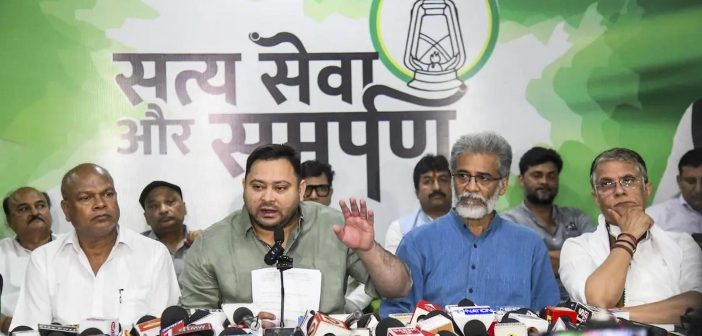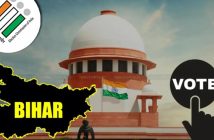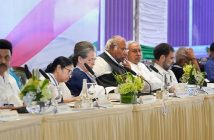The Bihar SIR voter list revision has sparked a political storm. Opposition parties cry foul, alleging voter suppression. Is a boycott of the 2025 Bihar assembly elections on the cards? The Election Commission defends its move, but concerns grow. Can democracy withstand this clash, or will it reshape Bihar’s electoral future? Dive into the controversy shaking India’s heartland.
Bihar’s political landscape is on edge as the Special Intensive Revision (SIR) of electoral rolls, ordered by the Election Commission of India (ECI), fuels a fierce debate. The Bihar SIR opposition boycott threat looms large, with parties like the Congress and the Rashtriya Janata Dal (RJD) accusing the ECI of manipulating voter lists to favour the ruling BJP-led NDA. The SIR, aimed at cleaning voter rolls, has raised fears of mass disenfranchisement, especially among people experiencing poverty and migrants. As opposition parties mull boycotting the 2025 Bihar assembly elections, questions arise about electoral fairness and democratic integrity. This article examines the Bihar SIR controversy, its implications, and the growing calls for a boycott of the polls.
What is the Bihar SIR?
The Election Commission announced the revision of the Bihar SIR voter list on June 24, 2025. It aims to update electoral rolls before the Bihar assembly elections 2025, scheduled for October-November. The ECI wants to ensure only eligible citizens are listed, removing duplicates and non-citizens. Bihar has 7.9 crore voters, with 4.96 crore on the 2003 rolls needing only to submit enumeration forms. The remaining 2.93 crore, added post-2003, must provide proof of birth and residence. For those born after 1987, parental documents are also required. The process began June 25, with a July 25 deadline for form submission.
The ECI claims the SIR ensures transparency and electoral integrity. Critics, however, view it as a tool to suppress voter turnout. The tight timeline and strict document requirements have sparked the Bihar SIR controversy, raising fears of excluding genuine voters.
Opposition’s Concerns: Why Consider a Boycott?
The Bihar SIR opposition boycott call stems from fears of voter disenfranchisement. Opposition parties, including RJD, Congress, and CPI(ML), allege the SIR is a “conspiracy” to remove poor, Dalit, and minority voters. Congress leader Pawan Khera called it a “clear conspiracy to disenfranchise Bihar voters.” The opposition claims that the ECI’s demand for documents, such as birth certificates, which only 2.8% of Bihar’s population born between 2001 and 2005 possess, is impractical. They argue the exclusion争夺 of
Migrant workers, forming 20% of Bihar’s voters, face exclusion risks due to their absence during verification. The omission of Aadhaar, a widely recognised ID, from the list of acceptable documents adds to the concerns. CPI(ML)’s Dipankar Bhattacharya noted the low form submission rate—14% by July 5—signals potential mass deletions. The opposition compares the SIR to the National Register of Citizens (NRC), alleging it targets specific communities.
Government and ECI’s Response
The ECI defends the Bihar SIR voter list revision, stating it’s a routine cleanup after 22 years. Chief Election Commissioner Gyanesh Kumar emphasised the importance of consultations with all parties and the transparency of the process. On July 6, the Bihar Chief Electoral Officer clarified that voters could initially submit forms without documents, with verification possible later through local inquiries. The ECI insists the SIR follows the Representation of the People Act, 1950, and aims to ensure only citizens vote. However, critics argue that the hurried timeline—forms printed and distributed within a day—lacks thorough preparation, thereby risking errors. The ECI denies any political bias, stating that the process is fair.
The ruling BJP and JD(U) dismiss opposition claims as baseless. They argue the SIR strengthens democracy by ensuring accurate voter lists. The state government supports the ECI, urging parties to participate actively through Booth Level Agents.
Political Reactions: A Divided Landscape
The Bihar SIR opposition boycott debate has polarised political leaders. RJD’s Tejashwi Yadav labelled the SIR “anti-democracy,” alleging it targets marginalised groups. Congress president Mallikarjun Kharge claimed the ECI backtracked due to pressure, citing relaxed document rules. CPI(ML)’s Bhattacharya warned of voter elimination at the draft stage.
BJP leaders counter that the opposition is politicising a necessary exercise. JD(U)’s Nitish Kumar, Bihar’s Chief Minister, supports the SIR, emphasising the importance of clean elections. The BJP accuses the opposition of fear-mongering to hide their electoral weaknesses. Meanwhile, Jan Suraaj Party’s Prashant Kishor, focusing on a caste-neutral campaign, remains silent on the boycott but criticises the ECI’s timing.
Legal and Electoral Implications
A Bihar SIR opposition boycott could have serious consequences. Legally, the SIR faces Supreme Court challenges from the Association for Democratic Reforms and activist Yogendra Yadav. They argue it violates the Representation of the People Act and Article 326, risking the disenfranchisement of lakhs. The 1977 Supreme Court ruling on ECI powers warns against creating a “constitutional despot,” which may influence the case.
Electorally, a boycott by major parties like RJD and Congress would delegitimise the polls. India’s democracy relies on competitive elections, and a one-sided contest could spark unrest. Smaller parties might also boycott to avoid being seen as government proxies. However, the ECI could proceed with elections, as no law mandates universal participation.
Politically, a boycott could fracture the opposition’s INDIA bloc, weakening their challenge against the NDA. It might also alienate voters, who value electoral participation, potentially benefiting the ruling coalition.
Public Sentiment: Confusion and Concern
Voters in Bihar, particularly in rural areas such as Saran, are confused about the SIR. Many lack awareness or the required documents. Villagers like Meena Devi, 66, question why their valid 2024 votes are now under scrutiny. Civil society groups, like the Association for Democratic Reforms, warn of mass exclusion due to Bihar’s low documentation rates. Political analysts argue the SIR’s timing, close to elections, fuels distrust. Social media reflects public anxiety, with posts on X calling the SIR a voter suppression tactic. Yet, some voters support the cleanup, hoping for fairer polls.
Future Outlook: Impact on Bihar’s Elections
The Bihar SIR controversy news could reshape the 2025 Bihar assembly elections. If the opposition boycotts, the NDA might gain a dominant position, but the legitimacy of the polls would suffer. The close 2020 election, in which the opposition lost by just 0.03% of the votes, demonstrates that every vote counts. A reduced voter list could swing results.
Alliance strategies may shift. The INDIA bloc’s unity could weaken if some parties participate while others boycott. The BJP-JD(U) coalition might gain, leveraging Nitish Kumar’s influence. Prashant Kishor’s Jan Suraaj Party, which focuses on education and jobs, could attract voters disillusioned by the row. The Supreme Court’s ruling on the SIR will be pivotal. A prolonged legal battle could delay elections, further complicating alliances.
The ECI faces pressure to simplify the process. Including Aadhaar and ration cards, as demanded by the opposition, could ease tensions. However, distrust in the ECI’s neutrality, fueled by past controversies in the Maharashtra election, may persist. The outcome hinges on public participation and judicial oversight.
Conclusion
The Bihar SIR voter list revision has ignited a political firestorm. Opposition parties, fearing voter suppression, threaten to boycott the 2025 Bihar assembly elections. The ECI defends the SIR as a necessary cleanup, but its timing and strict rules raise doubts. Legal challenges and public confusion add complexity to the situation. A boycott could undermine democracy, while participation risks legitimising a flawed process. The ECI must address concerns to restore trust. Bihar’s electoral future hangs in the balance, with alliance dynamics and voter turnout at stake. Transparency and inclusivity are key to resolving the Bihar SIR opposition boycott crisis.




